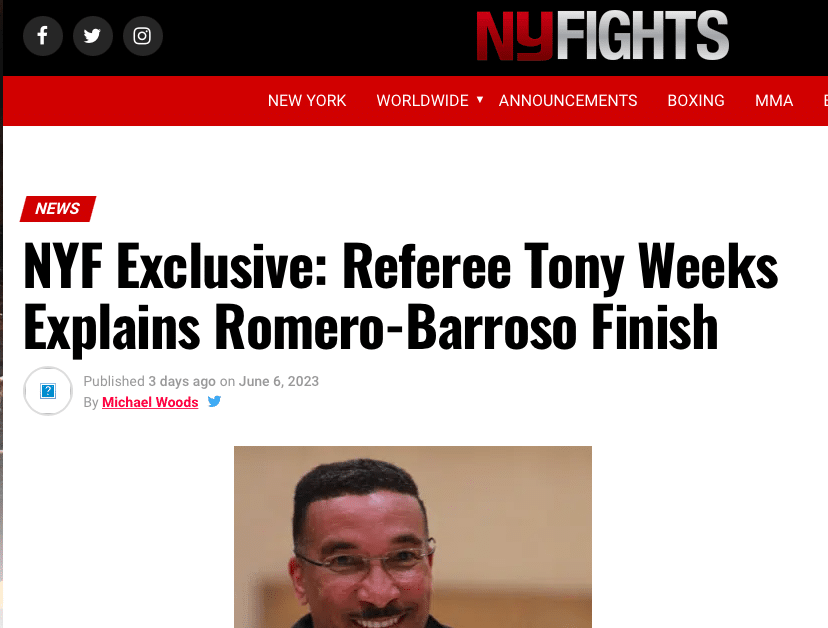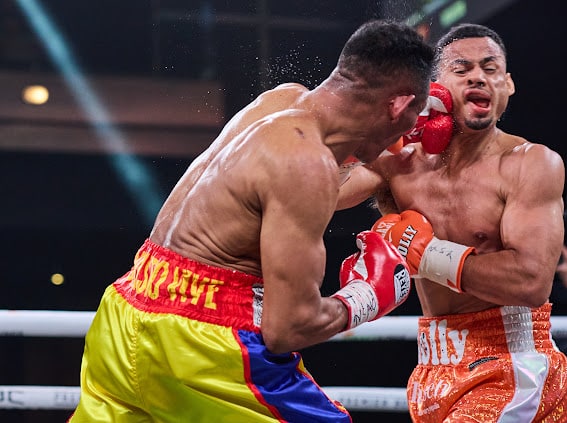There are many reasons for fight fans to be happy this year. Spence-Crawford, Fulton-Inoue, and Navarrete-Valdez officially on the schedule are all reasons for fans of the sweet science to be elated. Tank-Garcia, Haney-Lomachenko, and Benavidez-Plant are all reasons to be grateful, and with rumblings of AJ-Wilder later this year there is also reason to be hopeful. Not, maybe, so much if you are the type of person put off by the Tony Weeks situation.
Yes, after all this positivity in the way of making the best fights in boxing, there are still plenty of fans that would describe 2023 with a more pessimistic tone. There have been a few questionable moments, for sure.
Boxing Twitter Always Has Something To Bitch About
It seems like everyday there is someone on Boxing Twitter quick to remind everyone else that Haney-Loma was a travesty committed by judges “on the take.” There is zero evidence to suggest that is true.
However, the truest example this year of an egregious decision made on the part of a boxing official has to be the 9thround stoppage victory ruled in favor of Rolando “Rolly” Romero over Ismael Barroso. The official that night was referee Tony Weeks.

Barroso found success throughout the fight, especially with his left which Barroso was able to land in the closing moments of round 3 to score a knockdown on Romero—only the second time Romero has been down in his career.
Stepping into the main event only after Alberto Puello was pulled from the fight and stripped of his WBA junior welterweight title for testing positive for a banned substance under VADA, Barroso was up on all three judges’ scorecards at the time of the stoppage.
What made the stoppage seem worse was the questionable knockdown Weeks ruled in favor of Romero in the 9th and final round. It gave fans the feel that everything was being done to give Romero the benefit of the doubt, even if that was not the intention it was still the subconscious narrative.
The conclusion was so anticlimactic, too, which added to the confusion as very few of the punches thrown by Romero actually landed in the lead up to the stoppage.
What fueled the anger of the fans was Tony Weeks refusing to speak after the fight, according to ShowTime’s Jim Gray. It opened the door for fan speculation.

Tony Weeks Speaks To NYF Founder Michael Woods
However, Weeks finally opened up to NYFights.com’s Michael Woods in an article published on the site earlier this week. “Woodsy” strived for and achieved an unbiased piece of journalism free of judgement and personal presumption. And for his effort, he was rewarded by Weeks’ willingness to open up after he admitted his best course of action was not to comment during the initial reaction period.
What we learned from the piece was that referees are human. We learned that they are the professionals of a job that the majority of us only ever perform from our armchairs and without the actual instruction bestowed upon actual officials. Our main objective is to see a great fight, theirs is to see both fighters safe at the conclusion.
Context Added To Widen Your Base of Thinking, Perhaps
Keeping those realizations in mind, it is certainly easier to understand Weeks’ headspace as a professional ref, complete with the ability to empathize. The rest of us watching that fight and reffing from our vantage point are not thinking about Leavander Johnson— the fighter who passed away after injuries sustained in his September ’05 fight with Jesus Chavez.
Tony Weeks was the official in the ring that night and it was a point of reference in his Zoom call with Woods. That is something that Weeks has taken into every fight he’s refereed for nearly two decades.
Weeks was also quick to remind everyone that his job calls for context. He was fully aware of Barroso’s age and although he was unnecessarily ridiculed on social media for his “aged” physical appearance, it is difficult to blame Weeks for assuming the same when he had the closest vantage point.
It was encouraging to hear Weeks admit that he would not have stopped the fight if he was better positioned, citing his suboptimal vantage point as a hinderance while reminding that he does not have the benefit of 4K replay and multiple views of the same sequence.

Munguia Assesses Weeks Chat With Woods
That said, it was unfortunate that Weeks never specifically owned up to the fact that Barroso was ahead on the scores. He was grateful that both fighters came out of the fight unharmed, especially the 40-year old fighter. But he failed to acknowledge the suffering this decision has caused for a fighter closer to the end of his career than the beginning of it.
A win for Barroso would have made him a champion at a division loaded with big named fighters looking to pick up hardware. It would have meant more money and more fame at a point in his career where there is no guarantee he gets another chance.
(EDITOR NOTE: Woods here. In the course of the the talk with Tony, which lasted a good forty minutes, we exchanged conversation which didn’t make it into the story. One part of that: I said aloud my hope and faith in Barrosso getting another shot at Romero, being rewarded and not unfairly punished for looking like your uncle who has lived some hard decades.)
Following this piece, it is clear that Tony Weeks was not in anyone’s pockets, and with his stellar record in the sport it was borderline inappropriate to accuse him of conspiracy. But what has to be understood is that showing favor to the betting favorite/“A-side” can be a inadvertent. How do you police a tendency that subconsciously plays out in the media and unintentionally with officials?
So, for Weeks to let tensions calm before speaking out was smart, and his explanation (not excuse) was understandable if not acquitting. But could he have gone further?
Judgements, In This Age of Quick Condemnation, Can Get Heated
Judgment calls are part of every sport in one way or the other. I played baseball for most of my childhood before my career ended in college following a practice squad designation. I then decided to try umpiring, which was as simple as paying dues ($60) and going through a few seminars.
Being able to see the game from a different perspective gave me a new outlook on the game from a macro perspective.
This plays into Weeks’ reasoning of being “out of position.”
I recall covering my first Canelo fight in San Antonio the night he defeated Austin Trout. Immediately following the fight, there were fans at the arena that saw a closer fight than what we saw ringside. The fight was competitive, but Canelo won. But it is not hyperbole to say that a score can be altered by where you’re sitting in the arena, especially when compared to the vantage point at home.
Realizing that fights can look very different for those watching on TV as opposed to those in attendance is something you learn very quickly when covering the sport.
If you’ve ever seen a demonstration of “movie punching” you know that a punch that misses by a foot can look like a knockout blow from the right angle, and that could absolutely explain why Weeks saw something the rest of us didn’t.
So, what is the lesson?
Takeaways From Weeks-Romero-Barroso Situation
If you look at what Tony Weeks did and compare it to a missed pass interference call in football, or a called strike 3 on a pitch way out of the strike zone, or a called offensive charge on what should’ve been a 3-point play, it is safe to say Weeks’ miscalculation was free of intent.
However, what was intentional was our collective judgements. All of us who participated in or watched along as the intense, and at times downright ugly, scrutiny grew online and spread like moldy zombie fungus (“The Last of Us” reference, anyone?).
We did what we do as self-appointed social media avengers— we used our fears and emotions–often stemming from actual corruption we’ve seen play out in our sport–and weaponized them.
Were we right about it being a poor stoppage? Yes.
But what does virtue signaling achieve in spite of moral decorum? Coming out and saying you disagree with a ref’s call is fair game, but using hateful language or trying correlate one man’s bad night at the office with a grander corruption is careless.
Imagine you are working at your construction job and in a bout of carelessness you drop a tool that hurts someone, and then you get home and people are saying your responsible for Jimmy Hoffa. Okay, that might be a stretch, but I think my point is achieved.
Wise Message From Munguia
As previously stated, there are a ton of great fights on the horizon and many more yet to be announced, and if we can collectively learn from this then when one of those fights inevitably ends in controversy remember that the human beings responsible for keeping order in our sport have children and grandchildren. They are capable of love and compassion just as much as they are capable of feeling hurt.
They have had the closest seat in the house for some of the most devastating and violent fights in the sport’s history. That kind of trauma is not something you can just bury and forget.
I purposely did not use any quotes from Woods’ Tony Weeks piece because I urge you all to read it yourselves to get the full context of Weeks’ words. Click here to read it.
But I leave you with a quote from referee Russell Mora, who was coming off of his own controversy following the 2011 Abner Mares-Joseph Agbeko fight. The context differs heavily from Weeks’ own fight, but what is important here is Mora’s sincerity in an interview conducted by The Ring’s Lem Satterfield:
“I really felt like there was a death. I was very conflicted with what had died, but I knew that I had made a horrible call in the 11th round,” said Mora, 51. “When I read the headlines on Mares-Agbeko, I felt bad for them (the fighters) because I screwed up their fight. They were both marred after the fight for my mistake. I still don’t think that I’m completely over it yet.”
